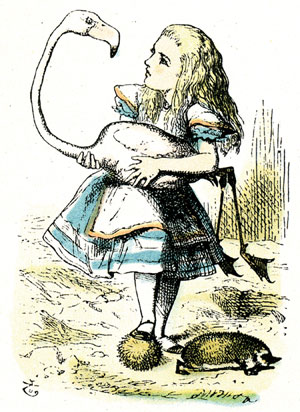Imperfect coupling
Par Eric Collias le mercredi 9 juin 2010, 13:04 - ecosophe - Lien permanent
blog d'Éric Collias, professionnel en écologie et sciences humaines appliquées à l'aménagement, intervenant an sein du master Espaces Ruraux et PériUrbanisation (ERPUR) de l'UFR Sciences de la Vie et de l'Environnement de l'Université de Rennes 1
Par Eric Collias le mercredi 9 juin 2010, 13:04 - ecosophe - Lien permanent
 Alice playing croquet with a hedgehog and a flamingo © Sir John Tenniel
Alice playing croquet with a hedgehog and a flamingo © Sir John Tenniel
By imperfect coupling of biological systems in the famous game of croquet, however, Carroll creates a meta-random game. Alice is coupled with a flamingo, and the “ball” is a hedgehog.
The “purposes” (if we may use the term) of these contrasting biological systems are so discrepant that the randomness of play can no longer be delimited with finite sets of alternatives, known to the players.
Alice’s difficulty arises from the fact that she does not “understand” the flamingo, i.e., she does not have systemic information about the “system” which confronts her. Similarly, the flamingo does not understand Alice. They are at “cross- purposes.” The problem of coupling man through consciousness with his biological environment is comparable. If consciousness lacks information about the nature of man and the environment, or if the information is distorted and inappropriately selected, then the coupling is likely to generate meta-random sequence of events.
Gregory Bateson, Steps to an ecology of mind
Commentaires
La situation dans laquelle se trouve Alice est comparable à celle de l'homme qui tente d'engager, avec son environnement, un rapport instrumental, cherchant à soumettre cet environnement à sa volonté, dans les mêmes termes que s'il s'agissait d'objets inanimés du monde physique.Gérard Pirotton, Des chiens ou des boules de billard ?
il y une analogie entre la tentative d'Alice de contrôler un hérisson à l'aide d'un flamand rose, et celle de certaines de nos prétentions de gestionnaires de l'environnement à vouloir contrôler les phénomènes (et les êtres qui y participent) à l'aide de systèmes d'information mobilisant une multitude d'indicateurs
une proposition sous-jacente à la réflexion de Grégory serait de proposer des mythes ou des paraboles possédant :
- une puissance d'inspiration aussi grande
- une possibilité de circuler dans les conversations aussi fluide
- et au cours de cette circulation, d'être réapproprié, réemployé à différents usages, mais suffisamment solides pour peu à peu permettre de nous aider à revoir notre épistémologie, et bricoler une meilleure co-existence avec cet environnement